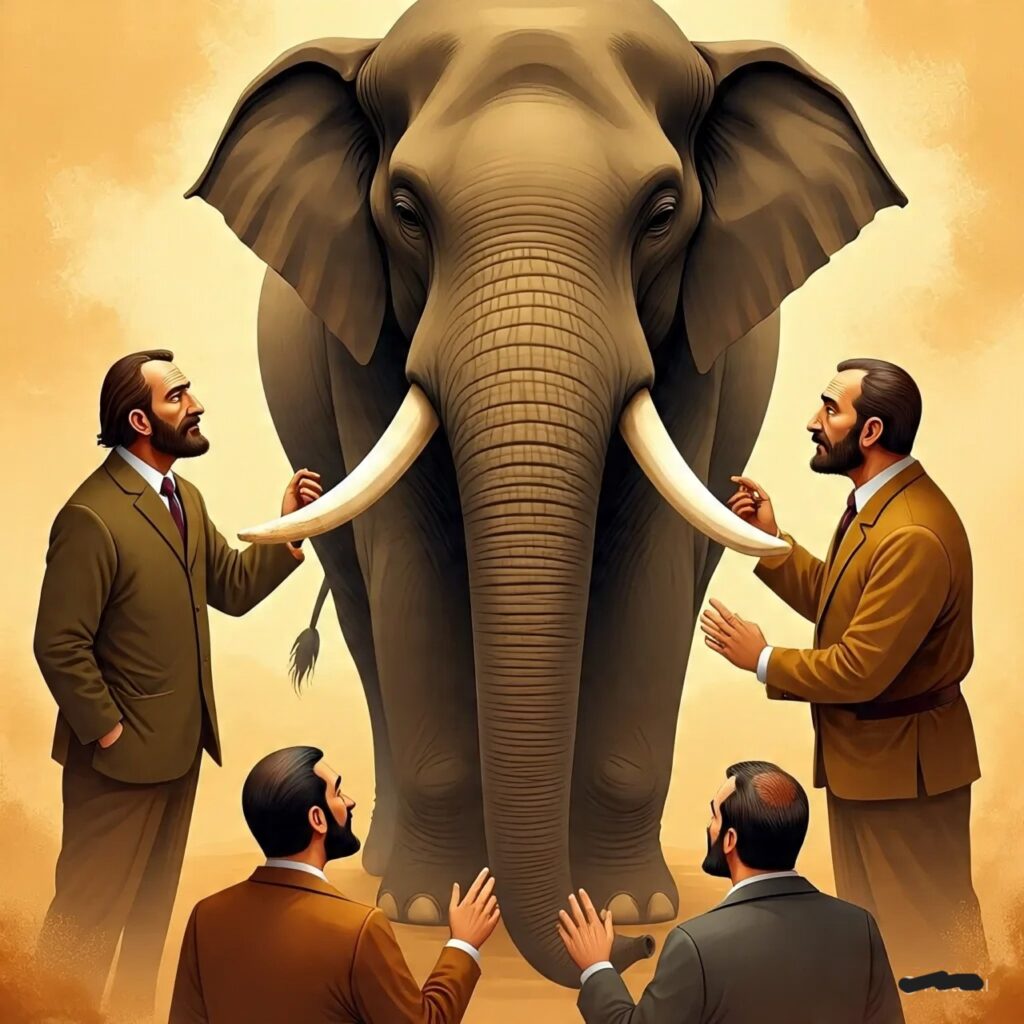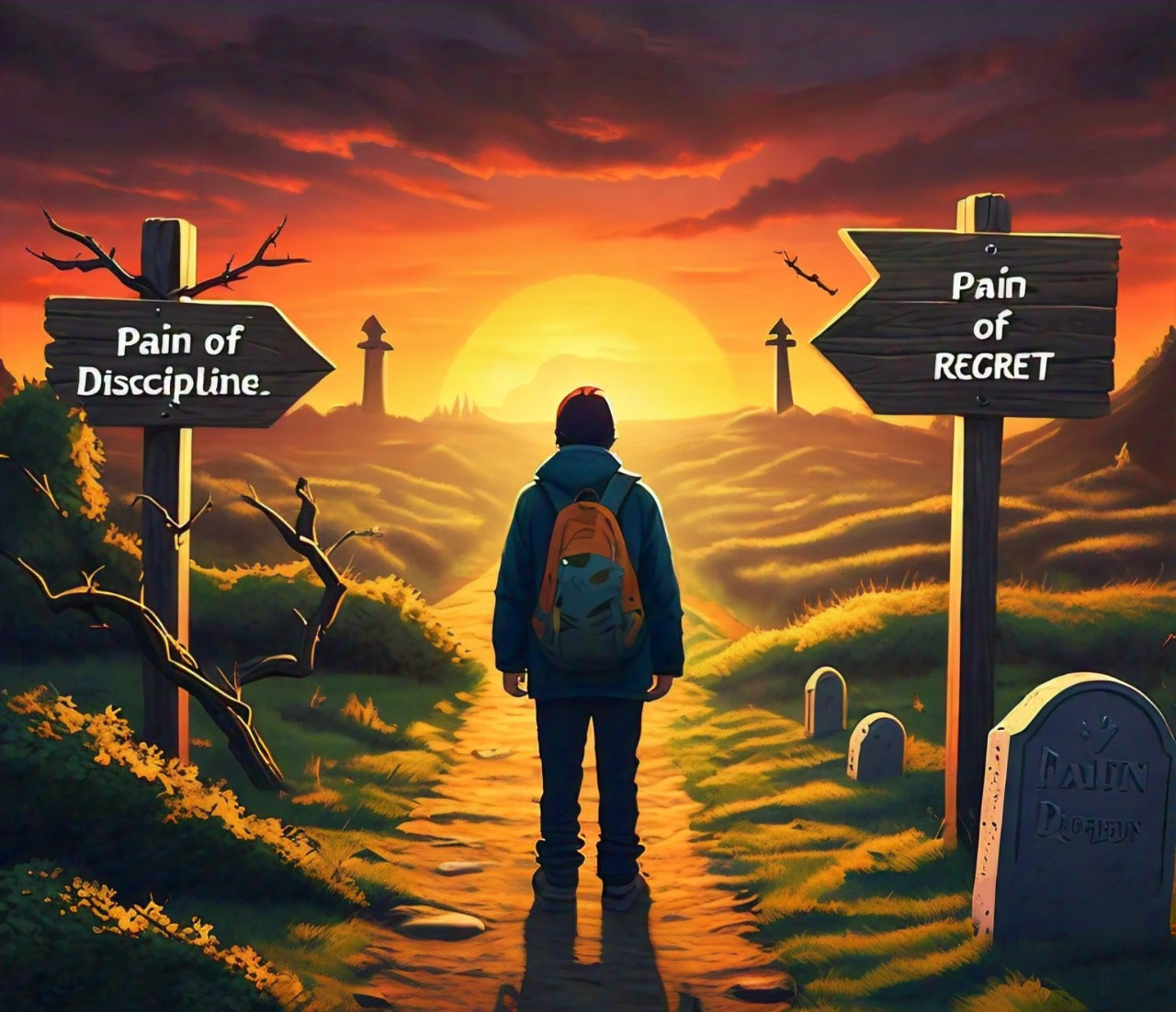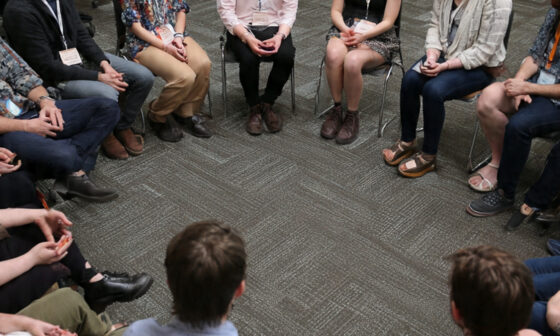So yesterday evening while I was watching one of Dave Chapelle’s Comedy specials, in one of his jokes, he said and described the analogy: Standing too close to the elephant, and I have not been able to stop thinking about it. You know there is an old parable about a group of blind men encountering an elephant for the first time, where each of them touches a different part: the trunk, the tusk, the leg, the ear. One insists the elephant is like a snake, another says it is like a spear, another says it is a tree. Now each man is convinced of his own perspective, and each is both right and wrong.
This is what it means to stand too close to the elephant. When we lock ourselves into a single detail, a single experience, or a single opinion, we lose sight of the bigger picture. The truth becomes fragmented, and our certainty becomes an illusion, but to live wisely, we must learn to step back, broaden our view, and see more than just the piece of the elephant in front of us, and this helps us kill the illusion of certainty.
The Illusion of Certainty
When you are pressed up against the side of the elephant, all you see is a wall of gray skin. You might swear the elephant is nothing more than a wall, and that is how human beings often treat truth and reality, we confuse our limited perspective with the whole story.
But the Stoics warned about this trap. Epictetus reminded his students, “It is impossible for a man to learn what he thinks he already knows.” Certainty sometimes blinds us, we stop listening, and we stop seeking. In the same way, the blind men arguing about the elephant were not wrong in their observations but they failed because they mistook their fragment for the whole, for certainty.

To you my dearest reader, my question is this: How often do you do the same? In arguments, relationships, politics, or faith, we become so attached to our view that we cannot imagine we might be missing something bigger. We need to learn to step back sometimes.
The Power of Stepping Back
The solution is distance both literal and figurative. Step back from the elephant, and suddenly the trunk, the tusk, the ear, the side all make sense together, because the fragments are part of a greater whole.
And Proverbs 18:13 warns us that: “To answer before listening; that is folly and shame.” Stepping back requires humility and patience; it means resisting the urge to win the argument or cling to being right. Instead, it is about asking, “What am I not seeing here? What is the bigger picture?”
Marcus Aurelius urged himself to zoom out from life’s details, reminding himself that even empires rise and fall, and by widening his perspective, he kept individual troubles in context. Likewise, when we step back from our own “elephants” whether problems, people, or disagreements, we gain clarity, balance, and often compassion. And this is wisdom beyond opinions.
Be careful not to dehumanize those you disagree with. In our self-righteousness, we can become the very things we criticize in others. – Eugene Cho
This quote made me question my assumptions and realize how simple it is to talk about a person or an entire group of individuals as if they are the enemy and not even humans. I know that failing to listen to the other side is wrong and I’m not claiming that listening to their argument will persuade you to change your mind; in fact, it’s possible that it won’t; they are, nevertheless, human beings, and something has affected and influenced them to believe in what they do.
The conflict has become entangled from humans vs. viruses to people vs. people.
We should learn to remind ourselves how to love and respect everyone, including those we disagree with because it is too easy to “dehumanize” anyone who does not share our ideas.
It’s very acceptable to disagree on a topic. It is impossible to prevent it with billions of people on the planet. In truth, conflict is an important component of our society’s development. We get to improve our collective decision-making skills by solving difficulties that arise. When people start using their differences as an excuse to demean others, we end up causing more issues than we solved.
Continue Reading: Disagreement Without Hate
Wisdom Beyond Opinions
At the end of the parable, each blind man has an opinion, but none has wisdom. Opinion is based on fragments, but wisdom comes from seeking truth beyond fragments, from admitting, “I don’t know everything.”
James 1:19 gives us a key: “Everyone should be quick to listen, slow to speak and slow to become angry.” That is how we move beyond mere opinion toward wisdom, by listening, observing, and refusing to let ego harden our perspective. The Stoics would agree, because for them, wisdom was about living in harmony with reality as it truly is, not as we insist it must be. To do that, we must seek truth with humility, knowing we only see part of the elephant, and being willing to learn from those who see a different part.
Read Also: What is Objective Truth: Is Truth Even Objective or Subjective?
Read Also: Why Ego is Your Enemy
Read Also: The Tongue as The Test of Character: Lessons From James 3:2
Conclusion
When we stand too close to the elephant, we lose sight of the whole. Our perspective becomes narrow, and our certainty becomes dangerous, but if we step back, listen, and remain humble, the fragments begin to connect, and wisdom takes shape.
Life is too big, too complex, and sometimes too mysterious to be reduced to a single opinion. Truth is larger than our personal experience, so instead of clinging to one piece of the elephant, let us step back, open our eyes, and seek the whole, because then and only then is where perspective matters far more than opinion.





